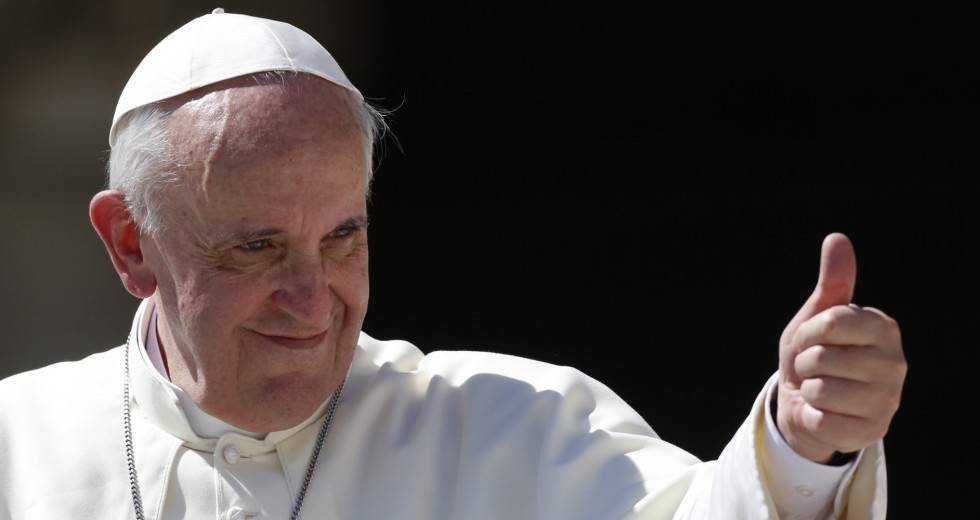A Busy Pontiff: How Pope Francis is Changing the World
“At secret negotiations over the past 18 months, which took place mainly in Canada between The Vatican, U.S. and Cuban officials the terms of an agreement for US-Cuba Re-engagement were set out, and finalized at the Vatican.” – AP
December 17th, 2014
SB Veda
Adorning the covers, this year, of Time, the Rolling Stone, and The Advocate (a magazine for gay news and rights) was a very unlikely figure: Pope Francis, head of the Catholic Church – long regarded as an institution in decline. From trying to welcome gays and lesbians into the fold to telling the world to share the wealth, to saying attacks on Christians by ISIS was tantamount to World War III, to calling out Italy’s most dangerous mafiosos, Pope Francis has become an extraordinarily relevant cultural figure, and is reinvigorating the Catholic Church.
World leaders have praised him, and he has come a long way since being a chemical technician and nightclub bouncer in Buenos Ares before beginning seminary studies.
On his 78th Birthday, today, he is exceptionally popular at an 88 percent approval rating among Catholics and revelations that he played a pivotal role in re-establishing ties between the United States and Cuba, may make him the most geopolitically influential Pope since Pope Alexander VI.
ROLE IN THE US-CUBA ENGAGEMENT
“Pope Francis issued a personal appeal to me and to Castro urging us to resolve Alan’s case and to address Cuba’s interest in three Cuban agents who have been jailed in the United States for more than 15 years – Barack Obama”
At secret negotiations over the past 18 months, which took place mainly in Canada between The Vatican, U.S. and Cuban officials the terms of an agreement were set out, and finalized at the Vatican last month. The agreement to re-engage includes the US restoring diplomatic ties with the opening of an Embassy in Havana, lifting of travel restrictions for American Citizens, importation of limited goods to the United States, and greater engagement in banking. President Obama will be sending an assistant secretary from the State Department to discuss Cuban American migration, and he will ask Congress to lift the embargo on Cuba that would permit the reforms to take place.
U.S. officials said Francis sent letters to President Barack Obama and Cuban President Raul Castro this summer urging the leaders to re-establish relations, the AP said. This included an appeal to release American Alan Gross and the three Cubans held in the United States, the official, who spoke on the condition of anonymity, said.
“Pope Francis issued a personal appeal to me and to Castro urging us to resolve Alan’s case and to address Cuba’s interest in three Cuban agents who have been jailed in the United States for more than 15 years,” Obama said in an announcement Wednesday.
According to the U.S. official, the letter “gave us greater impetus and momentum for us to move forward.” Officials also said Obama and Francis spoke about Cuba during a private discussion at the Vatican in March.
Obama and Cuban President Raul Castro spoke on the phone for 45 minutes Tuesday.
Besides the release of Gross and the three Cubans imprisoned in the U.S., the agreement also includes the release of an unnamed “intelligence asset” imprisoned in Cuba for 20 years. Obama has told Secretary of State John Kerry to discuss the reopening of an U.S. embassy in Havana.
“The support of Pope Francis and the support of the Vatican was important to us,” the U.S. official said.
In a statement made public after the Obama’s and Castro’s presidential addresses Wednesday, the Vatican described its role in the historic agreement.
“The Holy See received delegations of the two countries in the Vatican last October and provided its good offices to facilitate a constructive dialogue on delicate matters, resulting in solutions acceptable to both parties,” the Vatican said in a congratulatory statement.
Catholicism is the most prevalent faith in Cuba. The country was officially atheist between 1962 and 1992. Since then, a network of home churches has been established, and official Christmas observance has returned. Homilies and mass are allowed to be broadcast on government media.
Key members the socialist regime of Cuba were comfortable listening to this Latin American pope, who has consistently espoused greater social justice for the masses since being elected and whom they could accept as an ‘honest broker’.
Pope Francis is the first person member of the Jesuit Order, which believes in the poverty of Christ, to be elected Pope. He has been vocal in his belief that the differences between haves and have-nots must diminish. This plays well with the embattled socialists not only in Cuba but all over the World – and it has been one of the main reasons why he has been so vilified by right wing Christian fanatics in the United States, who hold sway over the Tea Party Republican constituency, there.
The pope’s critical views of capitalism are not surprising given that poverty and inequality are endemic in Latin America. According to the United Nations, Latin America dominates the ranking of the world’s top ten most unequal nations, with half of the entries: Bolivia, Brazil, Colombia, Guatemala, and Honduras. But Francis’ comments resemble the leftist rhetoric of many Latin American politicians, including Ecuadorian President Rafael Correa, Brazilian President Dilma Rousseff, Argentinian President Cristina Fernández de Kirchner, and Venezuelan President Nicolás Maduro. They have based their populist messages on blasting the liberal economic reforms that Washington, the International Monetary Fund (IMF), and the World Bank advocate and which they see as privileging market gains over social welfare and the fight against poverty.
 The Global Calcuttan Magazine
The Global Calcuttan Magazine 